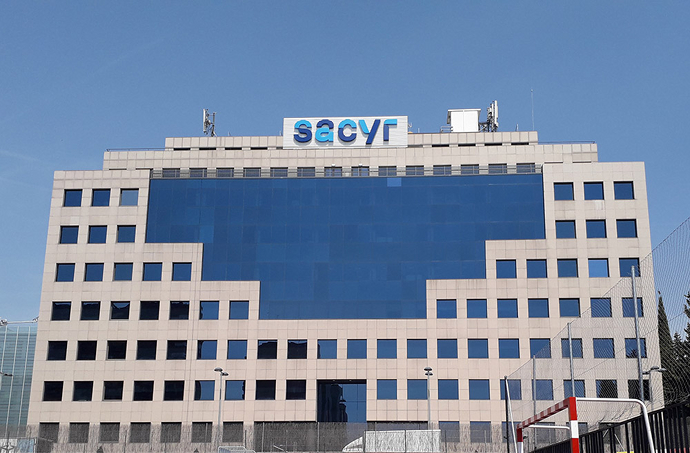The company’s headquarters in Madrid. Wikimedia photo.
Sacyr, the Spanish company that’s
trying to loot the Panama Canal
by Olmedo Beluche
Some folks hailed a ruling at the end of September by the International Chamber of Commerce’s Arbitration Court, based in Miami, which obliged the Spanish company Sacyr to return $265 million from a lawsuit over the construction of the Panama Canal’s third set of locks. The company alleged that the Panama Canal Authority (ACP) erroneously rejected the mixture of basalt and asphalt that it proposed to use.
However, the enthusiasm of the Panamanian public should be tempered, since Sacyr has filed lawsuits against the ACP on the order of $3.75 billion. The aforementioned 265 million barely constitute 8.8% of the total demanded. Everything else remains in dispute.
The problem is that, when in 2007 the Grupo Unidos Por el Canal consortium (GUPC), in which Sacyr was the majority partner, tendered its bid for the construction of the larger third set of locks, the total cost of the work was estimated at $3.118 billion. On that figure, the ACP ended up paying an additional $460 million, bringing the final cost of the work to $ 3.578 billion.
In other words, SACRYR makes the leonine demand for more than double the initial cost of the work. It’s absurd, and fraudulent from every point of view. If everything demanded was paid in favor of Sacyr, the final cost would go from the $3.118 billion estimated at the beginning to a total of $7.103 billion.
To top it off, thanks to neoliberal globalization, this attempted raid on Panamanian public funds is in the hands of a foreign tribunal, outside of our jurisdiction and sovereignty, in Miami. Let’s not celebrate too soon.
Historically, the looting of the Panama Canal’s resources by financial speculators began in the 19th century when the North American owners of the Panama Railroad Company, together with those of the French Universal Canal Company, conspired to rob the people of Panama and Colombia of rights over the railroad for which neither ever paid. That’s just to mention one of the incidents.
In Latin America, the news media commonly use the Brazilian construction company Odebrecht as the model of a corrupt company. However, they forget that others have also paid bribes and kickbacks to politicians. In Spain, Sacyr has been accused of paying politicians of the Partido Popular and has been involved in other questionable operations.
In the Panamanian case, it was questionable that CUSA, whose owners are the Alemán Zubieta family, to which the ACP administrator at the time when this concession was made belongs, was a junior partner with Sacyr in the GUPC. But that was “legal,” they say, because in Panama there is no conflict of interest law.
Contact us by email at fund4thepanamanews@gmail.com
To fend off hackers, organized trolls and other online vandalism, our website comments feature is switched off. Instead, come to our Facebook page to join in the discussion.
These links are interactive — click on the boxes












